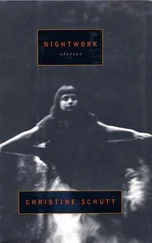Oh! Last night's Chinese food was rising in Theta's throat; she would burp with her mouth shut and smile, but so many shames gusted in her: her cheap shoes, the floppy sack meant to pass for a purse, and other, more hurtful details — thin hair, no waist, tired hands. Middle class! She was ugly and average — not very smart. She reached over and covered Marlene's hand with hers. "We should look into Wisconsin." Theta said, "We should look into Syracuse. Daddy and I liked it there."
"Marlene should look," Mrs. Quirk corrected, and Theta felt slapped, and she burped.
Mrs. Forestal came into the head of school's office and saw that the school nurse and Car's English teacher, Miss Hodd, were also in attendance for this meeting that the head of school, Miss Brigham, had arranged.
"An emissary from the lower school was just here with news we have more rabbits," Miss Brigham said, and her expression, Mrs. Forestal noted, was kindly.
More puffy talk ensued.
Miss Brigham motioned they sit, which the three women did, in a circle around Miss Brigham's partner's desk. The desk was the only real antique in the room and had belonged to Miss Siddons herself. Miss Brigham now stood behind it. "We won't take up your time, Mrs. Forestal," Miss Brigham said. "We have some concerns about Carlotta."
"Thank you, Miss Brigham, for refraining from using her nickname." Mrs. Forestal said to the nurse, "Her father thought it up and sadly it's stuck."
"Miss Hodd?" Miss Brigham asked Carlotta's English teacher to begin, and she did, with a lot of background — Car, Folio, the honor, Car as editor — but eventually got to the important part about a recent submission. Car's own work. "I told Car I felt obliged to show this story to the nurse, and she said she understood. She really didn't seem to mind, which made me wonder: Maybe this is a fiction, but I didn't want to take a chance." Now Miss Hodd gave a copy of the story to Mrs. Forestal.
"Does Carlotta see much of her father?" Miss Brigham asked.
"She hopes to see him over spring break."
"So she does see him?"
"She saw him last spring break."
"Dr. D says Car is worried about going to Paris," Miss Hodd said.
"Please, Carlotta is always worried about something."
The women made signs of agreement or understanding, of course; but the nurse asked, "Does she seem more anxious than usual?"
" There's Astra Dell, but frankly we don't much talk about Astra because there isn't much to say, is there?"
The nurse bowed her head, but when she looked up, she asked, "Carlotta has some eating issues, too, doesn't she?"
"I think so, yes."
The nurse said, "We think we should act before it gets more serious, Mrs. Forestal."
Mrs. Forestal spoke absently. "Yes," she said.
The nurse was more emphatic. "We think it is serious enough to warrant intervention."
"You think so?" Mrs. Forestal winced at the sound of her own voice, a high, stupid sound. Then she said again, "Yes," the gentle word, and she took up the sleeve of her sable coat and smelled it, which was to smell herself, her own sweet, perfumed, rich self. Then she could look up. Mrs. Forestal looked up at these women — the nurse, the English teacher, and the head of school — i n wonder at their kindness. "I'm grateful you thought to call."
Miss Brigham said, "Of course. We love Car. There you go. I guess the nickname fits. We want the tomboy back."
"So do I." Mrs. Forestal began abruptly and only to Miss Brigham, saying, "I haven't read this story. My daughter doesn't share her work with me. She is a very neat girl at home. I don't go into her room."
"Of course."
"I understand," said the nurse.
Miss Brigham and Miss Hodd and the nurse, all three sat erect and ready. They wanted to work with Mrs. Forestal. They wanted to look out for Carlotta was all. And with Mrs. Forestal's help, they believed they could address whatever it was that was making it hard for Carlotta to sleep at home.
"She is doing as well as ever. Her teachers give her very good reports, but she often goes to the nurse with headaches."
"She comes up to sleep in her frees."
Sleeping or not sleeping, apparently, was part of the story.
Mrs. Forestal said, "I see Carlotta coming out of her bedroom every morning." Her voice washed out as if she weren't sure of this fact as she sat in a room, conspiratorially well-intentioned. "I've seen Carlotta eat dinner." She sniffed at her coat sleeve again and reconsidered. "Well, maybe it's just playing with dinner. She eats with her baby pusher and fork, I'm ashamed to say."
The nurse was making little sounds again.
"I'm thin," Mrs. Forestal said.
A generally uttered, quiet "Yes" from the nurse, the English teacher, the head of school, then Mrs. Forestal heard the rustle of her own slip against her wool suit, heard the shush of her arms as she drew up her sable. She was thankful to be rich. "Yes," she said, accepting recommendations, some telephone numbers.
"Thank you," Mrs. Forestal said as she straightened and looked at the story — her daughter's — in her hands. The title was "Good Night."
Fathers
Mr. Dell did not understand what Dr. Byron had said except that it meant Astra would be off-limits to him; the radioactive rod to be sewn in her arm meant even to approach his daughter was dangerous. The nurses would attend to her masked. A rare cancer. Rare. Rare meant fatal, didn't it?
Mr. Dell missed his wife, and he resented the passing of time that took her further away from him. He wanted to look behind him and see her sitting on the edge of her chair but in no hurry to get up. Grace asking questions or telling little stories about her day. Walking tours, book clubs, social book clubs and church book clubs, Grace belonged, enrolled, was always a student. The way Grace laughed when she lifted off the pot lid and scared the cat with steam. "Serves you right!" Grace. To think of all the ways he missed her. The light adjustments she would make to his collar, his scarf, his tie, her hand's appraising caress as though she were attending to herself. The gift of this daughter, their only; after childless years, years of christenings and birthdays and the paper weight of someone else's child in his arms, the arrival of Astra did not surprise Grace. She simply took it as timely, a timely birth, but a birth she had nonetheless always expected. Her attitude was: We are graceful, handsome, philanthropic people of some small means, the Dells, and of course to us would come such a daughter.
Tomorrow that daughter would be off-limits. He could stand at Astra's door in a paper costume; he could look in; he could speak, but what could he say? Such suffering as hers could not be distracted except with drugs. Drugs on top of drugs. Wasn't his daughter too slight to withstand them? Morphine. Wouldn't it kill her?
Mr. Dell was a tall man with a kind face and little imagination, or so he looked to himself in the mirror of the window in his daughter's room. Most everyone he knew sometime got around to telling him that he was handsome, but he didn't see it. His eyebrows were too thick. And his interests? They were simple. He loved dogs and making breakfasts on Sundays. He rode horses. All of the Dells rode horses when they were on their farm in Virginia. They rode in Montana, too, and skied in Utah. Grace's legacy — a love of literature and decorative arts — was already in place in this girl of theirs. A lot of what he knew about art he knew from his wife; from his daughter he knew about modern dance. Last spring he had watched Astra alone onstage. He had seen her breastless dancer's body leap. She wore a tulle skirt in one dance, and in another she played in farmer's jeans. Whatever she wore, there was no way to hide her beauty. This was a fact he heard in the murmurs beside him. The point of her foot when extended, her ease and her arch and her surety, the prop of her red hair — a torch, a veil, a rag, a whip — contrastive accessories to the serenity of her wide-apart, beautiful face. By her bedside, befogged with so much feeling, unable to speak except to say good night, to pet what tomorrow he could not touch. He said, "Mommy is here," and then, because Grace would have liked it, they prayed, Astra and her father. He got up from his knees, a tall man, looking down at his daughter. "I'll be back in the morning," he said. "I can stand at the door. We'll sign to each other."
Читать дальше












